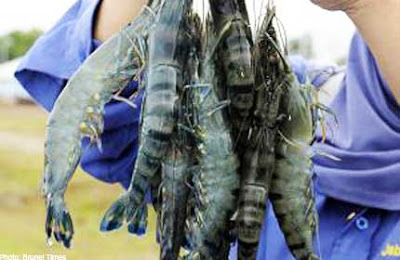Fisheries Promise for Brunei Darussalam
Economic Update from the Oxford Business Group on 11 February 2013:
+++++
Brunei Darussalam: Fisheries promise for industry
Asia | 11 Feb 2013
The launch of a major seafood processing plant highlights the progress the Sultanate is making in its plans to diversify from oil and resources and position itself as a centre of value-added industry. However, a shortage of available land to further develop the industry sector has been identified as a limiting factor.
In December 2012, the Multipurpose Marine Resources Processing and Business Centre, a $30m seafood processing plant, became fully operational. The facility is a result of collaborative efforts between Semaun Marine Resources and the Golden Corporation, an investment firm.
Innovative industry techniques at the processing centre see unmarketable fish that cannot be sold to consumers re-processed and turned into value-added products, such as surimi (fish puree). Previously, fishermen were discarding 70-90%, or 400-500 kg, of each catch.
In January, the government also announced the first harvest of its Brunei Darussalam specific pathogen-free (SPF) black tiger shrimp project. The five-year programme, in development since 2007 by the Department of Fisheries and US-based Integrated Aquaculture International, aims to produce genetically improved SPF black tiger shrimp.
South Korean officials have also identified seafood processing as an area of major investment potential. “I think our Bruneian partners should explore [fisheries] possibilities by working with Korean investors and with the Ministry of Industry and Primary Resources,” said Choi Byung Koo, the ambassador of South Korea to the Sultanate, when speaking to local media in October.
A month earlier, a visiting South Korean government official said the Sultanate has untapped opportunities for investment by South Korean firms, particularly in the areas of construction, tourism and food manufacturing.
“We look at Brunei as a high potential market in this region, due to its strategic location, and the country has a higher per-capita income than South Korea. Most South Korean companies believe Brunei is a great place to invest,” said Kyung-Yun Yeom, deputy head of the trade and investment unit at the ASEAN-Korea Centre.
There has also been increased interest in industrial parks and planned investment from elsewhere in East Asia, with Japan-based Mitsubishi announcing in October plans to expand its workforce in the Sultanate.
Mitsubishi recently opened a new office in Jalan Pemancha that will oversee a number of potential projects, including an ammonia production and pharmaceuticals plant, as well as existing projects on automated cultivation, sustainable agriculture and solar power.
Mitsubishi has a long, symbiotic history with Brunei Darussalam, having helped develop the oil and liquefied natural gas (LNG) industries that dominate the economy. For example, it participated in a major LNG project in 1970 at the start of the Sultanate's resource growth period.
The Japanese firm is behind plans for six downstream petrochemicals plants, with an aggregate investment of $2.8bn, to be built at the 271-ha Sungai Liang Industrial Park (SPARK). The plants are expected to produce a range of chemicals using Brunei Darussalam’s abundant natural gas as a feedstock.
In March 2012 it was revealed that SPARK had created 180 jobs since opening its doors in 2011, and the authorities estimate it will provide 2000 more employment opportunities as the petrochemical plants come online.
A study conducted by the Centre for Strategic and Policy Studies in April 2012 said Brunei Darussalam would need around 108,000 jobs in the private sector if it wants to achieve full employment by 2035. The study found that the Sultanate would also need an estimated 515,000 sq metres of commercial floor space and 1300 ha of land for industrial sites to support such growth.
However, critics say that to boost the industrial sector, the government must create opportunities for the private sector to invest in unused land. Roger Gibbins, chairman of SGS Economics and Planning, one of the consultants involved in the study for the land optimisation strategy for industrial and commercial growth, said in November that a land release programme would create opportunities for private sector investment.
“If you create the opportunities, the private sector will come along,” said Gibbins, pointing out that new land has not been released for private ownership in Brunei Darussalam since 1954.
+++++
+++++
Brunei Darussalam: Fisheries promise for industry
Asia | 11 Feb 2013
The launch of a major seafood processing plant highlights the progress the Sultanate is making in its plans to diversify from oil and resources and position itself as a centre of value-added industry. However, a shortage of available land to further develop the industry sector has been identified as a limiting factor.
In December 2012, the Multipurpose Marine Resources Processing and Business Centre, a $30m seafood processing plant, became fully operational. The facility is a result of collaborative efforts between Semaun Marine Resources and the Golden Corporation, an investment firm.
Innovative industry techniques at the processing centre see unmarketable fish that cannot be sold to consumers re-processed and turned into value-added products, such as surimi (fish puree). Previously, fishermen were discarding 70-90%, or 400-500 kg, of each catch.
In January, the government also announced the first harvest of its Brunei Darussalam specific pathogen-free (SPF) black tiger shrimp project. The five-year programme, in development since 2007 by the Department of Fisheries and US-based Integrated Aquaculture International, aims to produce genetically improved SPF black tiger shrimp.
South Korean officials have also identified seafood processing as an area of major investment potential. “I think our Bruneian partners should explore [fisheries] possibilities by working with Korean investors and with the Ministry of Industry and Primary Resources,” said Choi Byung Koo, the ambassador of South Korea to the Sultanate, when speaking to local media in October.
A month earlier, a visiting South Korean government official said the Sultanate has untapped opportunities for investment by South Korean firms, particularly in the areas of construction, tourism and food manufacturing.
“We look at Brunei as a high potential market in this region, due to its strategic location, and the country has a higher per-capita income than South Korea. Most South Korean companies believe Brunei is a great place to invest,” said Kyung-Yun Yeom, deputy head of the trade and investment unit at the ASEAN-Korea Centre.
There has also been increased interest in industrial parks and planned investment from elsewhere in East Asia, with Japan-based Mitsubishi announcing in October plans to expand its workforce in the Sultanate.
Mitsubishi recently opened a new office in Jalan Pemancha that will oversee a number of potential projects, including an ammonia production and pharmaceuticals plant, as well as existing projects on automated cultivation, sustainable agriculture and solar power.
Mitsubishi has a long, symbiotic history with Brunei Darussalam, having helped develop the oil and liquefied natural gas (LNG) industries that dominate the economy. For example, it participated in a major LNG project in 1970 at the start of the Sultanate's resource growth period.
The Japanese firm is behind plans for six downstream petrochemicals plants, with an aggregate investment of $2.8bn, to be built at the 271-ha Sungai Liang Industrial Park (SPARK). The plants are expected to produce a range of chemicals using Brunei Darussalam’s abundant natural gas as a feedstock.
In March 2012 it was revealed that SPARK had created 180 jobs since opening its doors in 2011, and the authorities estimate it will provide 2000 more employment opportunities as the petrochemical plants come online.
A study conducted by the Centre for Strategic and Policy Studies in April 2012 said Brunei Darussalam would need around 108,000 jobs in the private sector if it wants to achieve full employment by 2035. The study found that the Sultanate would also need an estimated 515,000 sq metres of commercial floor space and 1300 ha of land for industrial sites to support such growth.
However, critics say that to boost the industrial sector, the government must create opportunities for the private sector to invest in unused land. Roger Gibbins, chairman of SGS Economics and Planning, one of the consultants involved in the study for the land optimisation strategy for industrial and commercial growth, said in November that a land release programme would create opportunities for private sector investment.
“If you create the opportunities, the private sector will come along,” said Gibbins, pointing out that new land has not been released for private ownership in Brunei Darussalam since 1954.
+++++


Comments